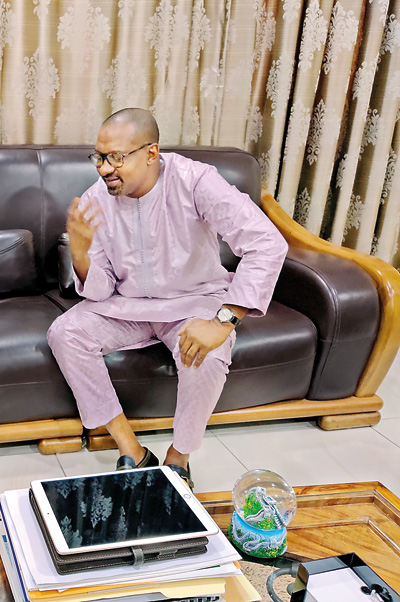News
Sierra Leone keen on an Agricultural FTA with Sri Lanka
West African, coastal country Sierra Leone is interested in signing a Free Trade Agreement (FTA) with Sri Lanka.

Sierra Leone Vice President Mohamed Juldeh Jalloh
The country is vigorously re-branding itself, after it elected a new president, Sierra Leone People’s Party (SLPP) candidate, Brig.(Rtd ) Julius Maada Bio, in March last year.
Sierra Leone Vice President (VP) Mohamed Juldeh Jalloh, in an interview with the Sunday Times, in the country’s capital, Freetown, this week, said Sierra Leone was keen to ink an FTA with Sri Lanka in the Agricultural sector.
“We are also very keen to form partnerships with Asian countries like Sri Lanka, for Technology transfer. We want partnerships with those interested in such transfers, to invest in our Mining sector. For example, in the Gold industry, we are open to setting up a Gold Refinery company,” he added.
VP Jalloh noted that, already, an Indian company is in the country to manufacture Computer Tablets and Mobile Phones. “In the Telecom, IT, service such as airport and port, there are many opportunities for Tech companies,” he said.
Sierra Leone has been integrated into the global economy through its export of Minerals – most notably Iron ore, Rutile and Diamonds – and the import of Capital goods (Technology), Petroleum products (Energy) and Food. Now riding on a different path to boost the economy, the country is aggressively showcasing itself at each major international forum. “The President himself attends these and explains the potential in the country and the changes in regulatory framework in the future etc, for potential investment,” Mr. Jalloh said.
Key areas the country is concentrating on at present, is free quality Education, accessible Healthcare and provision of water. “So, we want to go ahead with finding new avenues/resources for these 3 areas. In order to do this, we have implemented a financial management programme for fiscal discipline.
Mr. Jalloh said tThe country aims to boost its Agricultural sector, for which there are 3 overriding objectives. Priority No.1 would be self-sufficiency in Food, then, growth of Small & Medium Enterprises (SME), and enhancing Tourism.
“We want to reduce importing food items and create domestic production, through which we can defend our currency,” he said. Sierra Leone spends US$ 400 million annually, to import food items for a population of 7 million. “Of this, US$240 million alone is for Rice,” he said, adding that, Sierra Leone can learn much in the area of food self-sufficiency from Sri Lanka.
He also said that the government will encourage SMEs that have added to the value chain. “The country is also opening its Agricultural sector for investment. Sunbird Bioenergy (SL) Ltd, the world’s largest Biomass to power generation project by Browns Investments PLC (BI), has done a lot in terms of increasing employment in the Agricultural sector,” he said. He said Sierra Leone spends US$ 20 million annually, to buy Sugar.
Sunbird, which owns a 23,500-hectare Sugarcane estate, a 380,000-Litres/Day bio-ethanol plant and a 32MW Biomass power plant, aims to substitute Sierra Leone’s Sugar imports.
“We will be incentivising firms willing to expand in our Agricultural sector, like Sunbird. We would give Tax incentives to import large materials and give free land. In addition, we will also be taxing importation,” Mr. Jalloh said. The country is also working on establishing an industrial zone for foreign investment.
Sierra Leone is also keen on advancing its ‘blue’ economy – the Marine sector. “So far, we have only operated on licence fees from boats that pass by Sierra Leone. Now, we have received a grant from China to set up a Fisheries harbour,” Mr. Jalloh said.
He said the country is now in the process of building infrastructure for Tourism, while sprucing up historical tourist sites.
He said, Sierra Leone, rich in Mineral resources, had a bad spell in the past, as its Mining sector was badly governed. “So, now, we are improving its governance by concentrating on 3 key areas. To start with, we will make all Mining companies comply with the regulatory Legal framework.
Now, we are contracting a magnetic survey to gauge our investment potential in minerals, with World Bank support. Next, we will revamp institutions such as the National Mineral Agency, which oversees our Mining sector,” he explained, adding that, a National Investment Board will be established to oversee all investments and be a one-stop window, thereby reducing transaction costs for foreign investors.
Sierra Leone is also revisiting its Investment Act drafted 52 years ago. “This process will create a Legal and Regulatory environment attractive to an investment claimant,” Mr. Jalloh said.
He also said the country needs Energy to boost its Mining, Fisheries, Agriculture and Tourism sectors. “We need to move from Utility Energy to Productive Energy. In terms of Productive Energy, we are looking at affordable and accessible energy. We are exploring call and renewable energy in this regard, because they are clean, flexible and cheap.”

